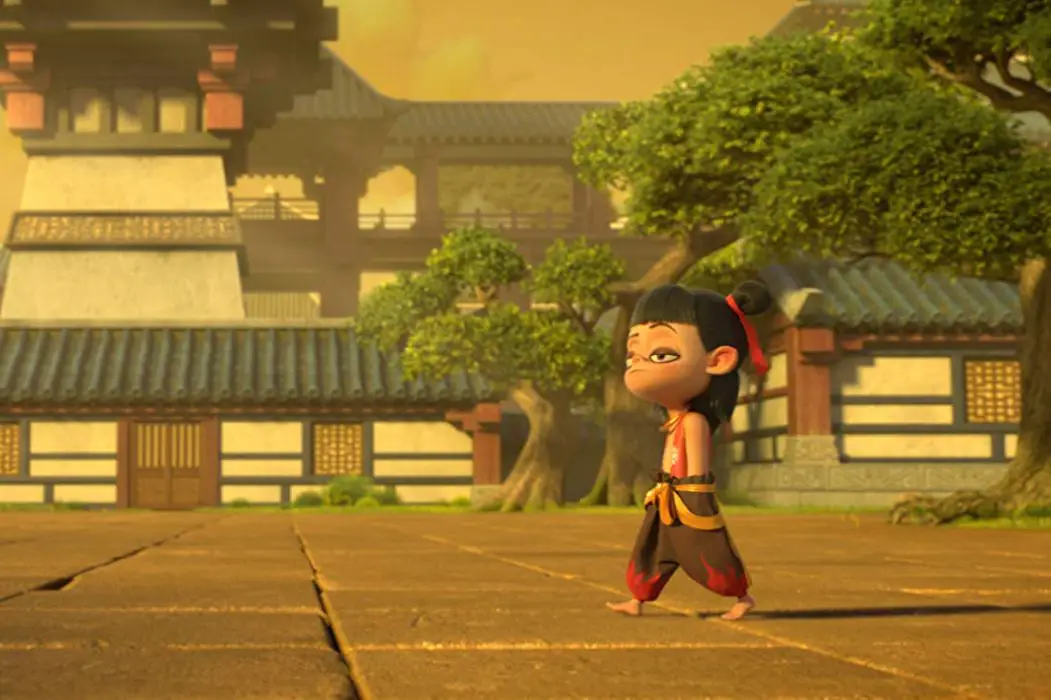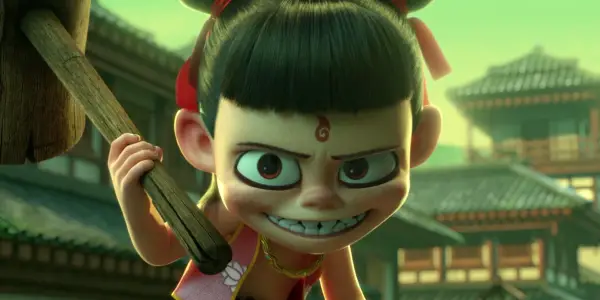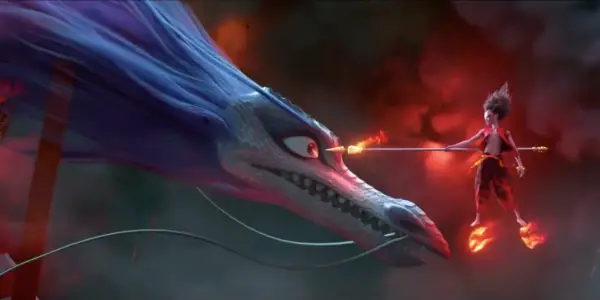NE ZHA 哪吒之魔童降世: Another Leap In Chinese Animation

Kevin L. Lee is an Asian-American critic, producer, screenwriter and…
This marks the second time this year where a Chinese production came along and surprised me over its direction, production value, and dedication to its source material. Ne Zha is already the highest grossing animated film in China’s history. If you watch it through the lens of what Chinese studios have been offering in the past decade, this title, alongside The Wandering Earth, demonstrates a major leap forward in quality.
Taking Advantage of a Real Chinese Myth
For those who are unfamiliar with the source material, Ne Zha is a child deity in Chinese folk religion. Much like Sun Wukong aka The Monkey King, Ne Zha has been featured in countless stories, films, and literary works, and is widely regarded as one of the most enduring figures in Chinese pop culture.

The film Ne Zha offers a simple but effective origin story on the mystical boy, specifically on how he was born out of a Demon Orb and is destined to be destroyed in three years by a heavenly curse. Raised by Li Jing and Lady Yin (also famed characters in Chinese mythology), Ne Zha grows up as a mischievous outcast, feared and maligned by all the villagers for his demonic powers.
What follows next is a journey of fate and friendship that I don’t want to give away as much, since I went in blind.
Typical Exposition and Juvenile Humor
With a story heavily based on real folktales and lore, a lot of plot points and character points are explained to us via expositional dialogue. Taiyi Zhenren, the Taoist teacher of Ne Zha, spends a good portion of the film explaining the “rules” of the film’s universe. These rules range from what is destined to happen later in the movie to what a specific magical object can do. For the Western viewers, this part of the storytelling comes off as China’s own version of a Harry Potter universe. Without a doubt, the script falls under the arguably lazy effort of spelling everything out to the audience so the viewer won’t have to think as hard. That being said, the “rules” are established quite quickly, leaving room for the film to freely play with its set pieces.
Scattered across the narrative is a handful of juvenile hit-and-miss humor, ranging from pee and fart jokes to ridiculous out-of-nowhere pop culture references that had me raising an eyebrow. They lack the smarts and instead embrace the full-on silliness and prankish nature of Ne Zha’s personality – easily entertaining for the kids, but expect some eye-rolling from the adults.
How’s the Animation?
From a strict point of view, the animation in Ne Zha is around the same tier as the first Kung Fu Panda –stylistic, fast-paced, fluid, but lacking in some textures. The first twenty minutes definitely took some time for the animation to grow on me. On the other hand, knowing what Chinese animation has offered in the past, I was blown out of my mind over its action sequences. Realistic animation is one way to look visually pleasant, but another way is knowing how to stage, frame, and transition action from one shot to the next. I am happy to say Ne Zha excels in the latter.

Epic Action & Music, Seemingly Pulled Out of a Manga
Ne Zha presents its action sequences like it was pulled straight out of a manga. The “camera” swoops alongside a kick, dodges like one of the characters would, and director Jiaozi knows exactly when to drop the slow-motion effect and when to provide a wide shot to emphasis the size and scope of his mystical characters’ powers.
The entire second half of Ne Zha is nothing but clean, breathtaking action that takes advantage of its own mythology. Add in some long continuous shots, epic music, and some exceptionally timed voice acting, and you may just find yourself emotionally blindsided. The score, provided by Wan Pin Chu, knows exactly when to incorporate the Chinese violin (二胡) and when to add in a choir for full effect. The voice acting completely nails difficult emotions like struggle, regret, nobility, and honor – all destined to be undermined by the eventual English dub voice acting.

It is here where everything in the technical department clicks together, where all of a sudden, I really started to care.
Ne Zha: The Passion Oozes Everywhere
Ne Zha has some shaky storytelling to begin with, but by the second half, it escalates into a full-fledged emotional animated blockbuster. There’s something about Asian epics that completely resonates with me as a viewer, where they fully commit to the source material and the passion oozes everywhere in the technical department.
Ne Zha might not be the best animated film of the year, but China is getting awfully close in competing against Hollywood’s animated offerings. In terms of writing, storytelling, and narrative subtleties, it has its drawbacks. But in terms of character motivations, decisions, and ideas, this won me over with a big heart.
Did you see Ne Zha? What did you think of the film? Share below!
Watch Ne Zha
Does content like this matter to you?
Become a Member and support film journalism. Unlock access to all of Film Inquiry`s great articles. Join a community of like-minded readers who are passionate about cinema - get access to our private members Network, give back to independent filmmakers, and more.
Kevin L. Lee is an Asian-American critic, producer, screenwriter and director based in New York City. A champion of the creative process, Kevin has consulted, written, and produced several short films from development to principal photography to festival premiere. He has over 10 years of marketing and writing experience in film criticism and journalism, ranging from blockbusters to foreign indie films, and has developed a reputation of being “an omnivore of cinema.” He recently finished his MFA in film producing at Columbia University and is currently working in film and TV development for production companies.













